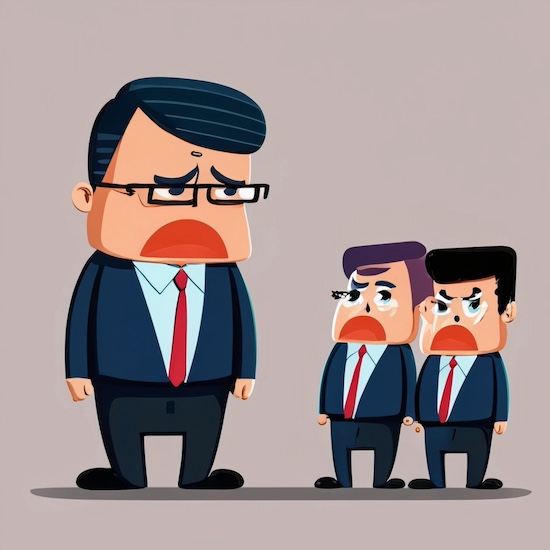Middle managers struggle with mental health at work, too
Mental health at work is a big topic right now. Managers have to learn how to watch out for and account for the mental health of their employees.
In a survey of 1,500 adults, 50% of them said they had left a job for mental health reasons. That should seem an astonishingly high number, but to me it seems about right.
I’ve left a job for mental health reasons. I got to a point where I needed to either flee the toxic workplace or get a cardiologist on speed dial. Not a hard choice. Glad I made it.

Image created by Adobe Express generative AI tool.
You may find it surprising that the workplace I had to flee was not one of the many startups I worked for. Nope. The company I left was a big one. A company frequently recognized as one of the “best places to work.” And it was… until it wasn’t.
With startups, everyone expects them to have a culture of high stress, long hours, and egotistical founders. Certainly fertile soil for dysfunction to take root and thrive.
But in my own experience, and judging from the hundred-plus clients I’ve spoken with over the past two years, dysfunction may actually be more common in larger companies.
Dysfunction grows in darkness
It’s hard to mask the causes of dysfunction in small organizations.
For sure, small organizations have their share of dysfunction. One bad executive with a big ego can create pure hell for everyone under them. But in small organizations, people can identify the source of the dysfunction, assess their own power to change it, and decide whether to stay or not.
They may be wrong about their assessment, but at least they can blame someone or something specific.
In a big organization, however, accountability gets diluted. Perspective gets skewed.
From inside, it can be almost impossible to identify the original source of dysfunction or how to address it.
In the worst cases, dysfunction becomes invisible. It starts getting treated as the normal course of things. People even begin perpetuating it as the company’s culture, unaware of how detrimental and damaging it actually is.
Rather than call it out as dysfunction, it’s treated as function. People start saying “that’s just how it is here.”
When all you know is dysfunction, then dysfunction looks like normalcy
I’ve seen this manifest in many ways. Usually, I hear about it when I’m talking with a new manager or someone who wants to go into management. They say things like
- I’m not the smartest engineer on the team.
Technical expertise is not the same as leadership. A culture that always puts most technically proficient in charge will never have a team that together is smarter or more imaginative than its manager. - I’m not a disciplinarian. I’m not good at laying down the law.
Discipline should be the last resort of a good manager, but it’s often the first tool of a bad manager. Fear is a poor motivator for long-term success. Punishing people for not meeting goals may feel like accountability, but in the end it’s just punishment. - Management is a lot of work. You have to know all the details of everything.
A manager who knows all the details is someone who doesn’t trust their team. Usually I’ve found this to mean that either micromanagement or analysis paralysis is the expected norm in this culture. - I am not sure I can always make the right decisions.
People make mistakes. A culture obsessed with eliminating mistakes is a culture that has trouble innovating, delegating, and learning. In some jobs, mistakes can literally lead to someone dying (airplane assembly, for example). In almost anything else, perfectionism is unwarranted and stifling. - That’s just how things happen here. Get used to it, or get out.
One guess as to which is the better option. Authoritarianism is very good at squashing creativity and inspiration, and it’s not nearly as good at productivity as it likes to think it is.
Imagine being a middle manager in one of these cultures. Now imagine being a middle manager in a culture with two, three, or even more of these traits.
Middle managers are squeezed
I have a special appreciation for the difficulties middle managers face in particular. These people are often forgotten in the discussion of employee mental health.
People think of manager or employee, rarely remembering that every middle manager is both.
Middle management is the sandwich class of management, having to report up to their leadership while keeping their team inspired and engaged.

Image created by Adobe Express generative AI tool.
Employees see middle managers as part of whatever structural or organizational dysfunction exists. To the employee, their direct supervisor is the voice and embodiment of the corporation.
This is also true of middle managers who report to someone else. To them, their supervisor is the voice of the corporation, and they may relate more closely to their team than their manager.
What an identity crisis the middle manager faces when they’re trying to build trust with their employees, yet they don’t trust their own supervisor. They are the voice of the corporation to one group while at the same time feeling disenfranchised by it.
I’ve experienced this myself. You may have, too.
And yet middle managers must be the solution
Middle managers are also best positioned to see and call out organizational and cultural dysfunction. And, I would argue, that is part of a middle manager’s duty.
A middle manager must be empowered to escalate truth, especially if it’s a truth that those at the top might not like to hear.
When the middle manager sees dysfunction, they can respond in one of three ways:
- Raise the issue and work to resolve it,
- Choose to stay silent and bear it as best they can, or
- Complain about it to others, spreading further discontent.
If you’re the one in charge, which choice would you rather your middle managers make?
And are you creating a culture that will help them make the right choice?
This is the kind of thing I help with
I am glad that many companies are providing mental health services as part of their health benefits and EAP. In addition to my private practice, I also coach through Spring Health, a company that provides mental health services through EAP and benefits programs.
Through Spring Health, I coach people on many topics. I help a lot of people with individual professional development and career direction. I also work with managers and executives on cultural and managerial issues like the ones above.
Everything from how to build trust with their teams, to how to communicate with their peers, to how to “manage up” effectively, to empathetic leadership, to self-awareness, to courageous leadership, to a wide range of other topics.
There’s a tremendous amount of stress and uncertainty out there. Even strong leaders benefit from having a disinterested third party to talk these issues through with. My extensive, diverse work and life experiences give me a perspective that has proven valuable in many conversations.
And the fact that a lot of people are discovering this through a benefits program at work is a good thing. It says to me that a lot of companies are getting more serious about watching out for mental health at work.
I can help.
I work with top executives and middle managers to improve their leadership skills, their workplace culture, and the effectiveness of their teams. Also, I help individuals identify and achieve their personal goals. Would you like to become more aware, be more effective, be more empowered, and feel fully prepared for your next steps?
You can help.
Think of one person who would benefit from reading this post. Sharing is caring! Forward it to them right now. They will think you’re super smart and well informed.
Stay informed.
Be sure to join my email list! Get notified of new posts here as well as new courses, books, and events from me both here and at Gray Bear Publications.



1 Comment
Don’t throw out the lightbulb just because it showed you an uncomfortable truth - Gray Bear Coaching LLC · April 15, 2024 at 9:31 pm
[…] when those things don’t happen, there’s usually more blame for the employees (or the middle managers) than what’s truly plaguing the […]